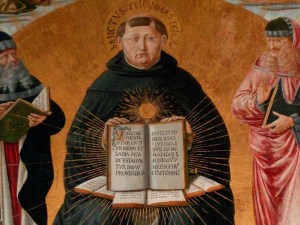Yikes, kids! I’m in danger of turning into a Thomist – as loose-limbed groupies of Thomas Aquinas are called – and I must be strong. He was a great and nuanced philosopher of religion but was not primarily interested in proving God’s existence. That was a preliminary, the step out the door into sunlight, before he even got into his car.
“God transcends all sensible things and sense itself,” he says. So how can we know him? We can’t – not his essence. But we can catch a glimpse of him based on “His effects” which are “sensible things.” It’s like looking at a footprint of the Abominable Snowman: it’s evidence of something, alright, but it ain’t the real Snowman.
In the lesser-known “Summa Contra Gentiles,” Aquinas is straight up about parroting Aristotle: “We shall first set forth the arguments by which Aristotle proceeds to prove that God exists.” He isn’t even trying to be original! If you don’t like the First Way, blame The Philosopher, not the Saint.
Way #1 in Plain English (and Pig-Latin): Called the “Unmoved Mover” or “First Mover” argument, it’s oversimplified as saying everything that moves was put in motion by something else. So who moved the first thing? God. We have, ahem, studied some Latin here at The God Project Dot Net, and Aquinas’ word “motus” means “change,” not just motion. Change is a journey from potential to actual. Like: You’re potentially wise but actually ignorant. Potential gets actual all the time, but it can’t get there on its own. You don’t get wise without help. Only one thing can get actual on its own without outside help. What? It-ay is-ay Od-Gay.
Way #2: Effects need a cause, and the first cause is You-Know-Who. Aquinas uses the phrase “efficient cause” 10 times in his short definition. It comes — big surprise, not — from Aristotle. An “efficient cause” is something that happens before the effect. (As opposed to “final” causes which happen after, which sounds weird unless you believe things can have a built-in goal that moves them. Newton killed this idea.)
Way #2 sounds identical to Way #1 unless you remember Way #1 wasn’t about motion; it was about how things can’t change themselves. Way #2 is about how effects can’t cause themselves.
All the Ways are related because they are different definitions of the same word: God. Now can you wait for Ways #3-5? Didn’t think so.






